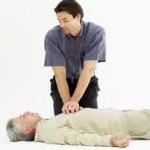Chest compressions alone better than standard CPR, study says
Performing chest compressions solely rather than the current standard of chest compressions with mouth-to-mouth ventilations on victims of heart attacks may achieve better likelihood of survival, a new study reveals.
The Austrian and American researchers of the study, which is published online in the journal The Lancet, claims that continuous, uninterrupted chest compressions is the best method of CPR.
“By avoidance of rescue ventilation (mouth-to-mouth) during CPR, which are often fairly time-consuming for lay bystanders, a continuous uninterrupted coronary perfusion pressure is maintained, which increases the probability of a successful outcome,” the authors concluded.
Moreover, the researchers pointed out that bystanders would more likely to perform this procedure because it is relatively more straightforward and simpler to do than standard CPR.
The research team analyzed data from three separate trials of some 3,000 victims who received CPR from bystanders.
Those who received chest-compression-only CPR had a survival rate of 14 percent, while victims who received standard CPR only registered a 12 percent survival rate.
“This confirms that chest compressions save lives. And there is no need for mouth-to-mouth,” said Dr. Tamara R. Kuittinen, director of medical education in the department of emergency medicine at Lenox Hill Hospital in New York City. Dr. Kuittinen was not involved in the study.
Previous studies also revealed the effectiveness of chest-compression-only CPR.
A University of Michigan study in September said that victims of cardiac arrest who received chest compressions before being defibrillated had equal chances of survival with those who receive immediate defibrillation.
The New England Journal of Medicine also published similar findings of two studies in July which showed that chest compression alone was equally effective to doing compressions with mouth-to-mouth for victims outside the hospital setting.
